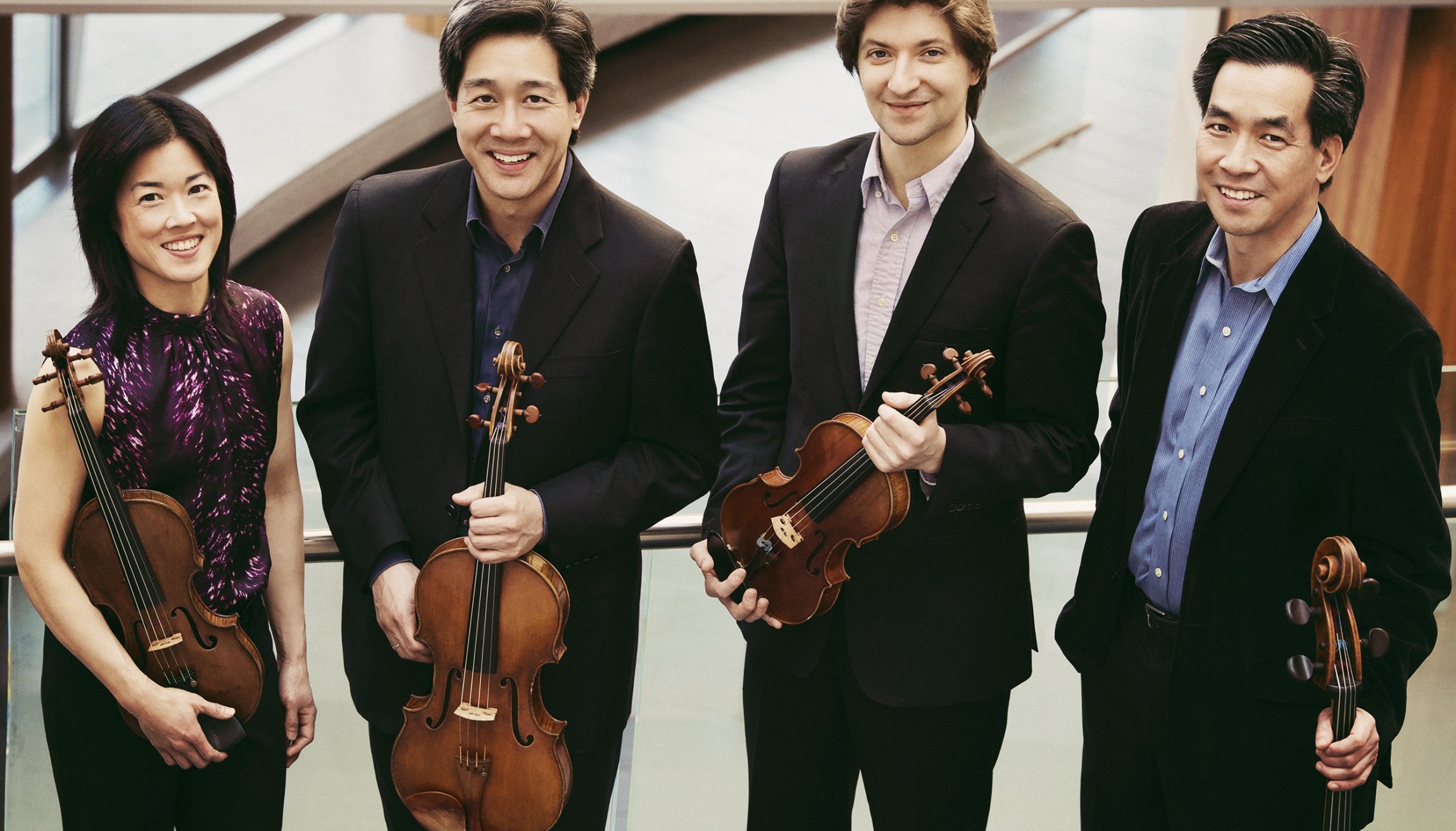Ying Quartet: February 12, 2018
Festival Artistic Directors David Ying and Phillip Ying bring their Quartet to Brunswick for a special concert this February in partnership with Bowdoin College. The program begins with Beethoven’s Quartet Op. 74, composed amid the tumultuous invasion of Vienna by Napoleon’s army, and nicknamed the “Harp” after the frequent pizzicato figures bounced between the players. This is followed by Conference of the Birds, commissioned by the Ying Quartet with funds from the Institute of American Music and freshly composed by Christopher Theofanidis, who was nominated for a 2017 Grammy Award for Best Contemporary Classical Composition. The program closes with Dvořák’s String Quartet No. 11, a work commissioned by a Viennese ensemble in which Dvořák pays tribute to the quartet tradition of that city, but not without evoking his Czech heritage in the folk music gestures of the exuberant Finale.
LUDWIG VAN BEETHOVEN
String Quartet No. 10 in E-flat major, Op. 74, (“Harp”)
The early months of 1809 brought Beethoven cause for celebration: Prince Lobkowitz, Prince Kinsky, and Archduke Rudolph joined forces to provide Beethoven with the financial stability that he had been lacking, provided that he remain based in Vienna. With such newfound support, Beethoven began contemplating marriage, travel, and even the possibility of a future promotion to the title of Imperial Kapellmeister.
However, the revery was abruptly curtailed by the Napoleonic invasions into Vienna in May of that year. While the aristocrats (including Beethoven’s new patrons) fled to the country, Beethoven remained stranded in the city, where the tumult of battle stifled his creative energies. Explaining his stagnation to his publisher, he wrote: “The whole course of events has in my case affected both body and soul. The existence I had built up only a short time ago rests on shaky foundations. What a destructive, disorderly life I see and hear around me: nothing but drums, cannons, and human misery in every form.”
Despite the upheaval, Beethoven managed to resume composing by the end of the year, completing his fifth Piano Concerto (the “Emperor”), the String Quartet, Op. 74, and three piano sonatas. Beethoven had pushed the boundaries of quartet composition three years earlier with his three “Razumovsky” quartets, Op. 59; in Op. 74, Beethoven’s innovations are less formal, and more textural: the quartet earned its nickname, “The Harp”, from the pizzicato figures, bounced among the players, which link the two principal themes of the first movement. Beethoven dedicated the work to Prince Lobkowitz, who by autumn had returned to the capital and was able to host the premiere at his home.
Christopher Theofanidis
The Conference of the Birds
Christopher Theofanidis has provided the following program note to accompany The Conference of the Birds:
The Conference of the Birds is a 12th Century Sufi allegorical poem by the Persian poet, Attar of Nishapur, and tells the story of the seeker’s journey toward God. In the allegory, all the birds of the world convene and determine that they need a ruler. Such a leader is known in the form of the mythic and divine bird, Simorgh, who resides in a distant land, and the journey to it is through seven valleys of understanding, the first of which requires the birds to cast off all their preconceived ideas and dogma in their thinking, and the final of which requires annihilation of the self in order to attain complete communion with the divine. The valleys are:
The Valley of Quest
The Valley of Love
The Valley of Unity
The Valley of Knowledge
The Valley of Detachment
The Valley of Wonderment
The Valley of Poverty and Annihilation
My 15-minute work piece traces this metaphoric journey in seven short character pieces, each lasting between 1 and 3 minutes, and each focusing on a highly defined musical personality evoked by the corresponding valley. Much of the string writing is inspired by the flocking movement of birds; that is, there is a ‘group logic’- a kind of unity of movement and purpose in which all the parts are highly interdependent.
The Conference of the Birds was commissioned by the Howard Hanson Institute for American Music of the Eastman School of Music at the University of Rochester for the Ying Quartet.
ANTONÍN DVOŘÁK
String Quartet No. 11 in C major, Op. 61
By the early 1880s, Dvořák had begun to enjoy international acclaim. He had been granted generous prizes from Austrian State Stipendium each year from 1874-78, having impressed an illustrious jury comprising Brahms and Hanslick, among others. With Brahms’s support, Dvořák’s music caught the attention of German publishers with vast networks; and by the end of the decade, his Slavonic Dances for piano had been performed across Europe and even in North America. In 1881, amid this growing fame, Dvořák was concentrating principally on an ambitious operatic project, Dimitrij, which he interrupted to compose the String Quartet No. 11.
We might habitually associate Dvořák’s chamber music with evocations of Czech folk music from his native country – as in his “Dumky” Trio (1891) – or perhaps of African-American spirituals from his years in the United States – as in his famed String Quartet No. 12 (1893), nicknamed “the American”. Dvořák had been developing his compositional use of folksong throughout the late 1870s and 1880s. However, when Dvořák was commissioned to write the present string quartet, he stepped away from these tendencies to embrace a distinctly Viennese mould. Perhaps this stylistic decision was inspired by the source of the commission, Josef Hellmesberger, a prominent personage from a dynastically musical Viennese family. Hellmesberger had been director and professor of violin at the Vienna Conservatory and concertmaster of the Court Opera orchestra, a role previously held by his father, Georg Hellmesberger; in 1849, Josef had formed a string quartet, which his son, Josef Jr., joined in 1870. The Hellmesbergers thus represented a distinctly Viennese musical legacy; and Dvořák, for whom the commission will have been a tremendous honor, bore this legacy in mind while fulfilling the commission.

